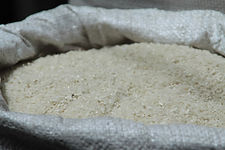Grain-Based Diet
A few months before Mr. Fluffy died, I was watching PBS and saw a piece with Dr. William Davis, the author of "Wheat Belly." I’ve read the book and highly recommend it, and also just purchased his next book, which was at least part of the reason for his appearance on public television. As he was talking to the audience, he mentioned that grains can cause nutritional deficiencies by affecting absorption, and you still need to correct those deficiencies when you get off the grains.
As is my habit, I then started thinking about how that applied to our pets. Having fed kibble (not to mention the vomiting/regurgitation it caused), is Mr. Fluffy deficient in certain vitamins and minerals? I checked my “Wheat Belly” book to see if there was more information, and in the chapter about, get this, celiac disease, the author mentions that wheat/grains can, over time, break down the lining of the small intestine, which then leads to the inability to absorb nutrients. This can lead to deficiencies in “protein, fatty acids, and vitamins” and he specifically mentions B12, the fat-soluble vitamins A, D, E and K, and “folate, iron and zinc.” This breakdown in the lining can also lead to “leaky gut.” He mentions that celiac can lead to, among other diseases, auto-immune diseases including IBD and (food) allergies.1
I then checked my “Prescription for Nutritional Healing” book and under celiac, it mentions that, in addition to the diarrhea, nutritional deficiencies and weight loss, infants and small children can experience vomiting. “Malabsorption becomes a serious problem, and the loss of vitamins, minerals and calories results in malnutrition . . .“ It continues, “Bone disease, such as osteoporosis, central and peripheral nervous system development . . . are just some of the long-term maladies that can affect those with celiac disease.” It further states that it can be “difficult to diagnose because the symptoms are similar to those of other diseases, such as irritable bowel syndrome, gastric ulcers and anemia.”2 [emphasis added]
Here’s my point: what if what we call IBD in our cats/dogs is a feline/canine version of celiac?
It would be helpful if there was a test available to determine such deficiencies in pets. If they exist, I’m not aware of them except for one that uses the pet’s fur, however I’ve never used it and don’t know how accurate it is. Blood tests won’t show certain deficiencies, because the body needs to maintain certain minerals in the bloodstream in order to live.
What I love about the “Prescription” book is that it tells you what supplements you should take for the disease, and why they help (there is no official cure for celiac). In the case of celiac, it mentions Essential Fatty Acids (Omega 3s), amino acids (protein) and probiotics, along with B vitamins, vitamin A and E. The EFAs are “needed for the villi in the intestines” which absorb nutrients and are damaged/destroyed by gluten (grains).
Then I checked my “New Vitamin Bible” to find animal sources of these things, and the ones that pretty much hit all of the fat-soluble vitamins are fish liver oils (note the “liver”), eggs (or egg yolks), milk and dairy products. Liver, for those feeding it (I didn’t -- he couldn’t tolerate it), covers all of them except K, however K2 is formed by probiotic bacteria. Other forms of K are plant-based. Iron, folate and zinc are also found in egg yolk, dairy, and meat.3
I also referred to the “Prescription” book for Irritable Bowel Syndrome. It recommends EFAs and L-glutamine, an amino acid, calling it a “major metabolic fuel for the intestinal cells; maintains the villi, the absorption surfaces of the gut.” It does not include vomiting in the symptoms.4
References
1 Davis W. Wheat Belly 2011; 76-77
2 Balch P. Prescription for Nutritional Healing, 4th ed, 2006; 314
3 Mindell E. New Vitamin Bible 2011; 37-135
4 Balch P. Prescription for Nutritional Healing, 4th ed, 2006; 529-530

Grains can break down the lining of the small intestine, which can lead to an inability to absorb nutrients.

Rice and other grains are not part of a carnivore's diet, and in fact, can lead to absorption issues.

Dry food is high in carbohydrates like wheat, rice, barley, corn, etc.



